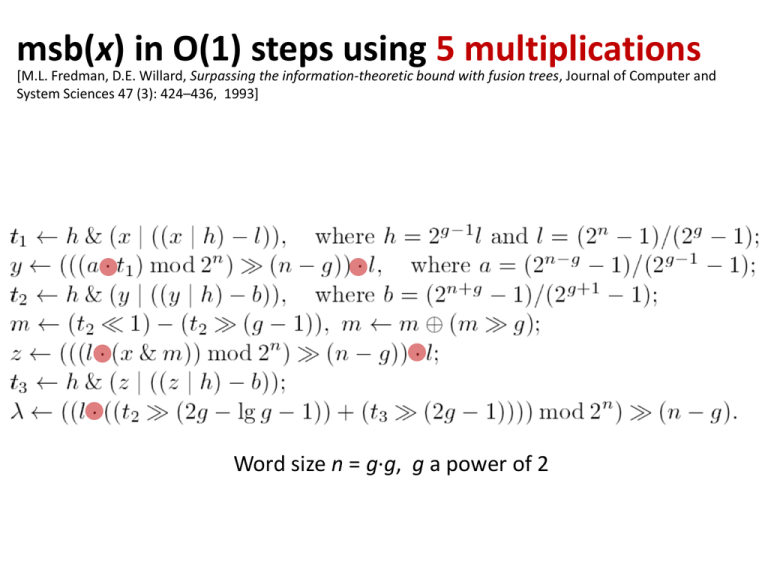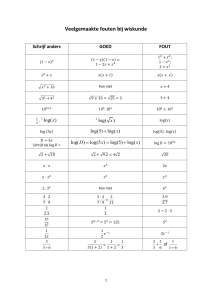pptx - Department of Computer Science
advertisement

msb(x) in O(1) steps using 5 multiplications
[M.L. Fredman, D.E. Willard, Surpassing the information-theoretic bound with fusion trees, Journal of Computer and
System Sciences 47 (3): 424–436, 1993]
Word size n = g∙g, g a power of 2
RAM model (Random Access Machine)
w bits
CPU, O(1) registers
*
XOR
+
shift-right
NOT
AND
write
read
not an AC0 operation
Complexity =
# reads
+ # writes
+ # instructions performed
010100111010101
001010101010111
110101010101001
111010100101010
110110101010101
111100011110101
111100011111101
111010101010101
111010100101010
110110101010101
111100010000101
111010100101010
110110101010101
100010011110101
000000011111101
100010011110101
000000011111101
000011111111101
111111111111111
Memory, infinite
OR
shift-left
0
1
2
3
4
.
.
2
Radix Sort
w/log n x COUNTING-SORT
= O(n∙w/log n)
GOAL: Design algorithms with complexity
independent of w (trans-dichotomous)
[M.L. Fredman, D.E. Willard, Surpassing the information-theoretic bound with
fusion trees, Journal of Computer and System Sciences 47 (3): 424–436, 1993]
w bits
1
2
3
4
.
.
010100111010101
001010101010111
110101010101001
111010100101010
110110101010101
111100011110101
111100011111101
111010101010101
111010100101010
110110101010101
111100010000101
111010100101010
110110101010101
n
100010011110101
000000000000000
000000000000000
000000000000000
000000000000000
000000000000000
[Cormen et al. 2009]
3
Sorting
Comparison
Radix-Sort
[T96]
[HT02]
[AHNR95]
O(n∙log n)
O(n∙w/log n)
O(n∙loglog n)
O(n∙loglog n) exp.
O(n) exp., w ≥ log2+ n
[M. Thorup, On RAM Priority Queues. ACM-SIAM Symposium on Discrete Algorithms, 59-67, 1996]
[Y. Han, M. Thorup, Integer Sorting in 0(n log log n) Expected Time and Linear Space, IEEE Foundations of Computer
Science, 135-144, 2002]
[A. Andersson, T. Hagerup, S. Nilsson, R. Raman: Sorting in linear time? ACM Symposium on Theory of Computing, 427436, 1995]
Priority queues (Insert/DeleteMin)
Comparison
[T96]
[T96,T07]
O(log n)
O(loglog n)
O(loglog n) exp.
[M. Thorup, On RAM Priority Queues. ACM-SIAM Symposium on Discrete Algorithms, 59-67, 1996]
[Y. Han, M. Thorup, Integer Sorting in 0(n log log n) Expected Time and Linear Space, IEEE Foundations of Computer
Science, 135-144, 2002]
[Mikkel Thorup, Equivalence between priority queues and sorting, J. ACM 54(6), 2007]
4
Dynamic predecessor searching (w dependent)
[vKZ77]
[BF02]
O(log w)
O(log w/loglog w)
[P. van Emde Boas, R. Kaas, and E. Zijlstra, Design and Implementation of an Efficient Priority Queue, Mathematical Systems Theory
10, 99-127, 1977]
[P. Beame, F.E. Fich, Optimal Bounds for the Predecessor Problem and Related Problems. J. Comput. Syst. Sci. 65(1): 38-72, 2002]
[M. Patrascu, M. Thorup, Time-space trade-offs for predecessor search, ACM Symposium on Theory of Computing, 232-240, 2006]
Dynamic predecessor searching (w independent)
Comparison
[FW93]
[AT07]
O(log n)
O(log n/loglog n)
O(log n/loglog n)
[M.L. Fredman, D.E. Willard, Surpassing the information-theoretic bound with fusion trees, Journal of Computer and
System Sciences 47 (3): 424–436, 1993]
[A. Andersson, M. Thorup, Dynamic ordered sets with exponential search trees. J. ACM 54(3): 13, 2007]
5
Sorting two elements in one word...
...without comparisons
X
Y
test bit
0
0
1
0
1
0
1
0
0
0
1
1
1
0
0
1
w bits
6
Finding minimum of k elements in one word...
...without comparisons
0
x1
0
x2
0
x3
0
x4
0000000
0
min(x1...x4)
w bits
0
0000000
0
0000000
0
Searching a sorted set...
7
Batcher’s bitonic merger
[K.E. Batcher, Sorting Networks and Their Applications, AFIPS Spring Joint Computing Conference 1968: 307-314]
[S. Albers, T. Hagerup, Improved Parallel Integer Sorting without Concurrent Writing, ACM-SIAM symposium on Discrete
algorithms, 463-472, 1992]
word implementation, O(log #elements) operations
increasing
sequence
decreasing
sequence
Round 1
Round 2
Round 3
Round 4
Remark: Sorting networks recently revived interest for GPU sorting
8
van Emde Boas (the idea in the static case)
[P. van Emde Boas, R. Kaas, and E. Zijlstra, Design and Implementation of an Efficient Priority Queue, Mathematical
Systems Theory 10, 99-127, 1977]
min,max
0,13
0,2
13,13
0,2
13,13
0,0
2,2
13,13
2,2
0,0
0
1
2
13,13
3
4
5
6
7
8
9
10
11
12
13
14
15
Universe U ≤ 2w
Predecessor search = find nearest yellow ancestor
= binary search on path O(loglog U)
Space O(U)
9
van Emde Boas (addressing)
[P. van Emde Boas, R. Kaas, and E. Zijlstra, Design and Implementation of an Efficient Priority Queue, Mathematical
Systems Theory 10, 99-127, 1977]
min,max
array indexing
roots by msb bits
0,13
0,2
0,2
13,13
002
0,0
012
102
2,2
13,13
2,2
0,0
0
1
2
13,13
112
13,13
3
4
5
6
7
8
9
10
11
12
13
14
15
Universe U ≤ 2w
10
van Emde Boas (dynamic)
[P. van Emde Boas, R. Kaas, and E. Zijlstra, Design and Implementation of an Efficient Priority Queue, Mathematical
Systems Theory 10, 99-127, 1977]
1 recursive top-structure and U bottom structures
of the most and least significant log U/2 bits
Keep min & max outside structure 1 recursive call
min=0, max=13
9= 2 ∙4+ 1
O(loglog U)
search & update
002
012
102
112
11
van Emde Boas (pseudo code)
[P. van Emde Boas, R. Kaas, and E. Zijlstra, Design and Implementation of an Efficient Priority Queue, Mathematical
Systems Theory 10, 99-127, 1977]
succ(i)
{ i = an + b }
if i > max then return +
if i ≤ min then return min
if size ≤ 2 then return max
if bottom[a]. size > 0 and bottom[a].max ≥ b then
return an + bottom[a].succ(b)
else if top.max ≤ a then return max
c := top.succ(a + 1)
return cn + bottom[c].min
insert(i)
if size = 0 then max := min := i
if size = 1 then
if i < min then min := i else max := i
if size ≥ 2 then
if i < min then swap(i, min)
if i > max then swap(i, max)
{ i = an + b }
if bottom[a].size = 0 then top.insert(a)
bottom[a].insert(b)
size := size + 1
delete(i)
if size = 2 then
if i = max then max := min else min := max
if size > 2 then
if i = min then i := min := top.min ∙ n + bottom[top.min].min
else if i = max then i := max := top.max ∙ n + bottom[top.max].max
{ i = an + b }
bottom[a].delete(b)
if bottom[a].size = 0 then top.delete(a)
size := size – 1
O(loglog U)
12
van Emde Boas (linear space)
[P. van Emde Boas, R. Kaas, and E. Zijlstra, Design and Implementation of an Efficient Priority Queue, Mathematical
Systems Theory 10, 99-127, 1977]
9= 2 ∙4+ 1
min=0, max=13
002
012
102
112
Buckets = lists of size O(loglog U), store only bucket minimum in vEB
(Perfect) Hashing to store all O(n) non-zero nodes of vEB
O(n) space, O(loglog U) search
13
O(n∙loglog n) Sorting
[M. Thorup, On RAM Priority Queues. ACM-SIAM Symposium on Discrete Algorithms, 59-67, 1996]
loglog n recursive levels of vEB
bottom of recursion log u / log n bit elements
subproblems of k elements stored in k/log n words
mergesort O(k ∙ log k ∙ loglog n / log n)
merge-sort
merging
2 words
#elements
per word
O(loglog n) priority queue
[M. Thorup, On RAM Priority Queues. ACM-SIAM Symposium on Discrete Algorithms, 59-67, 1996]
vEB
≤ log n min in single word
Sorted lists of size 2i in
2i /w words
14
O(log n) Dynamic predecessor searching
[A. Andersson, Sublogarithmic Searching Without Multiplications. IEEE Foundations of Computer Science, 655-663, 1995]
vEB - log n recursive levels
w / 2log n bit elements
packed B-tree of degree = 2log n
and height log n / log = 2log n
...
...
...
degree
search keys sorted in one word
O(1) time navigation at node
15
Sorting in O(n) time ?
16



